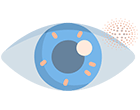Retinitis Pigmentosa Precision Panel
Retinitis Pigmentosa (RP) comprises a complex group of inherited dystrophies characterized by degeneration and dysfunction of the retina, affecting photoreceptor and pigment epithelial function.


Retinitis Pigmentosa (RP) comprises a complex group of inherited dystrophies characterized by degeneration and dysfunction of the retina, affecting photoreceptor and pigment epithelial function. RP can be an isolated finding or be part of a syndrome that can be inherited in a dominant, recessive or X-linked pattern. This disease presents as progressive loss of night and peripheral vision, leading to a constricted visual field and markedly diminished vision. The clinical presentation of these findings is highly variable, some patients being affected during childhood while others are asymptomatic well into adulthood. There is an increase in mortality rate due to psychiatric comorbidities.
The Igenomix Retinitis Pigmentosa Precision Panel can be used to make an accurate and directed diagnosis as well as a differential diagnosis of blindness ultimately leading to a better management and prognosis of the disease. It provides a comprehensive analysis of the genes involved in this disease using next-generation sequencing (NGS) to fully understand the spectrum of relevant genes involved.
The clinical utility of this panel is:
Daiger, S. (2007). Perspective on Genes and Mutations Causing Retinitis Pigmentosa. Archives Of Ophthalmology, 125(2), 151. doi: 10.1001/archopht.125.2.151
Hartong, D., Berson, E., & Dryja, T. (2006). Retinitis pigmentosa. The Lancet, 368(9549), 1795-1809. doi: 10.1016/s0140-6736(06)69740-7
Dias MF, Joo K, Kemp JA, et al. Molecular genetics and emerging therapies for retinitis pigmentosa: Basic research and clinical perspectives. Prog Retin Eye Res 2018; 63:107.
Tsang, S. H., & Sharma, T. (2018). Autosomal Dominant Retinitis Pigmentosa. Advances in experimental medicine and biology, 1085, 69–77. https://doi.org/10.1007/978-3-319-95046-4_15
Hims, M. M., Diager, S. P., & Inglehearn, C. F. (2003). Retinitis pigmentosa: genes, proteins and prospects. Developments in ophthalmology, 37, 109–125. https://doi.org/10.1159/000072042
Daiger, S. P., Bowne, S. J., & Sullivan, L. S. (2014). Genes and Mutations Causing Autosomal Dominant Retinitis Pigmentosa. Cold Spring Harbor perspectives in medicine, 5(10), a017129. https://doi.org/10.1101/cshperspect.a017129
Na, K. H., Kim, H. J., Kim, K. H., Han, S., Kim, P., Hann, H. J., & Ahn, H. S. (2017). Prevalence, Age at Diagnosis, Mortality, and Cause of Death in Retinitis Pigmentosa in Korea-A Nationwide Population-based Study. American journal of ophthalmology, 176, 157–165. https://doi.org/10.1016/j.ajo.2017.01.014